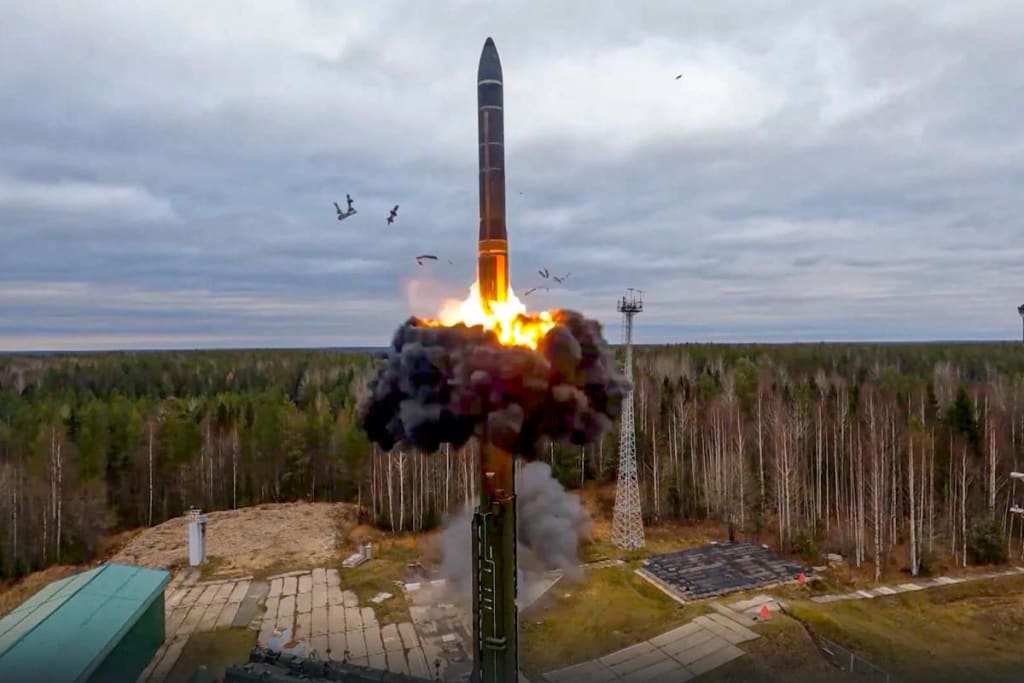Russia's Threat to Rescind Nuclear Test Ban: A Dangerous Move in Troubled Times 🇷🇺 🪖
Nuclear test on the verge of unfolding?

Russia's recent threat to rescind its ratification of the Comprehensive Nuclear Test Ban Treaty (CTBT) has raised global concerns about the potential consequences of such a move. This treaty, aimed at ceasing all nuclear explosions worldwide, was adopted in 1996 and has been adhered to by most nations, except for the United States. Russia's intentions to revoke its ratification appear to be driven by political motives and could have far-reaching implications on global security. In this article, we will delve into the background of the CTBT, Russia's threat, and the potential catastrophic outcomes of resuming nuclear testing. The Comprehensive Nuclear Test Ban Treaty, adopted in 1996, represents a landmark global effort to curb the testing of nuclear weapons. It imposed a suspension on all nuclear testing, whether above or below ground, with the aim of preventing the proliferation of nuclear weapons and reducing the risks associated with them. The treaty received widespread international support, and the United States and Russia were among the signatories.The United States, however, never ratified the treaty, making it more of a guideline than a legally binding obligation for signatories. Despite this, the international community, except for North Korea, has upheld the ban on nuclear testing since then. Deputy Foreign Minister Sergey Ryabkov recently announced Russia's intention to rescind its ratification of the CTBT, citing the need to mirror the United States' stance. He stated that Russia would not carry out any actual nuclear tests unless the United States did so first. This move by Russia is seen by many as a hollow threat, given the lack of credibility that Russia currently holds in the international arena. Nevertheless, the potential consequences of such a decision are alarming, especially considering the heightened nuclear tensions in the world. The CTBT was first signed by the United States, but ratification required approval from the Senate. Senate Republicans repeatedly delayed the treaty's consideration for three years, mainly due to concerns about the United States' ability to maintain a reliable nuclear arsenal without future testing and doubts about the treaty's verification mechanisms. The Senate Democrats' demand for a hearing and a vote on the CTBT in 1999 ultimately led to its consideration. The Republican majority fast-tracked the treaty, and a rushed vote was held, resulting in its defeat by a narrow margin of 51 to 48. Senate Republicans who voted against ratification had two primary concerns. First, they were uncertain if the United States could maintain a reliable nuclear arsenal without further testing. Second, they expressed doubts about the treaty's ability to detect cheating by other nations. The United States initiated a stockpile stewardship program to address the first concern, focusing on ensuring the safety and reliability of its nuclear arsenal without testing. Officials from national nuclear laboratories and the commander of Strategic Command certified the arsenal's reliability annually. Additionally, the CTBT had a global monitoring system maintained by partner nations to detect any nuclear tests. This system included nearly 300 surveillance stations worldwide and could detect tests with a yield as low as one kiloton. The National Academy of Sciences had even greater confidence in the monitoring system's capabilities. Russia's decision to rescind its ratification of the CTBT is highly destabilising, considering the current global nuclear tensions. Iran's potential nuclear advancements and the simmering tensions between India and Pakistan further complicate the situation. Russia's attempts to use nuclear provocations as a tool of deterrence and manipulation have been met with skepticism by the international community, which remains resolute in supporting Ukraine. NATO has pledged to increase support for Ukraine in response to nuclear threats or attacks. Russia's decision to backtrack on the CTBT could lead to further global support for Ukraine and increased condemnation of Russia. Russia's threats to conduct nuclear tests, whether as a show of force or for propaganda purposes, are misguided and dangerous. While such tests could be used for propaganda value, they come at a tremendous financial cost and could have catastrophic implications for global security. The financial resources needed for nuclear testing are substantial, and in a time when Russia is grappling with a fiscal deficit, pursuing a testing program would divert resources away from critical needs. Moreover, the environmental and human consequences of nuclear tests are dire. The United States is close to implementing the Scorpius project, a groundbreaking initiative that will allow for the study of nuclear weapon implosion in greater detail. By 2027, this project will provide valuable data about the reliability of aging weapons, rendering actual nuclear testing unnecessary. Russia's threat to rescind its ratification of the CTBT is a dangerous move that could have dire consequences for global security. The international community must remain steadfast in supporting nuclear non-proliferation and upholding the ban on nuclear testing. It is essential to prioritize diplomatic solutions and deterrence mechanisms to prevent any actions that could lead the world closer to an actual nuclear conflict. Nuclear testing should remain a relic of the past, and global cooperation in maintaining peace and security should be our shared goal.
About the Creator
Rakindu Perera
I’m a highly successful content writer with articles recognised by huge varieties of organisations. Also being in completion of a Bachelors Degree in Mechanical Engineering, I have the upmost know when it comes to exteme applications.






Comments
There are no comments for this story
Be the first to respond and start the conversation.